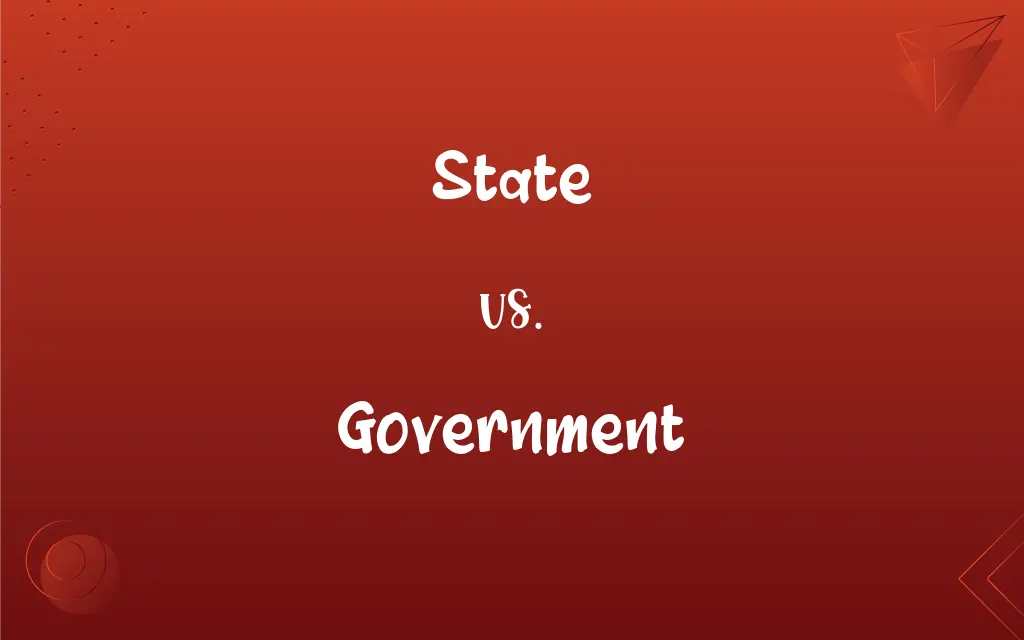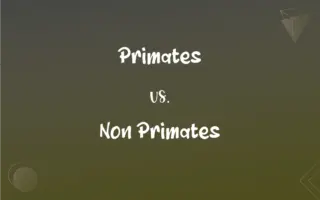State vs. Government: What's the Difference?
Edited by Janet White || By Harlon Moss || Updated on October 21, 2023
A state refers to a politically organized body of people in a defined territory, while a government is the institution or group of people that governs and enforces laws in that state.

Key Differences
A state is a specific territory with defined boundaries and a permanent population. Within this territory, a government functions as the principal authority, making decisions and implementing policies.
The concept of a state implies a recognized entity in the global community, capable of entering relations with other states. On the other hand, government is the internal mechanism through which state decisions are made and executed.
States can have different forms of governments, such as democracies, monarchies, or dictatorships. The type of government dictates how power is distributed and exercised within the state.
While a state remains relatively constant unless there are territorial changes, a government can change through elections, coups, or other political processes.
A state provides the overarching identity for its inhabitants, often tied to nationality. In contrast, a government serves as the managing body, determining how the state will function and operate.
ADVERTISEMENT
Comparison Chart
Definition
A defined territory with a permanent population.
The institution governing that territory.
Duration & Stability
Relatively stable and permanent.
Can change through various processes.
Global Recognition
Recognized as an entity by other states.
Does not have international standing.
Types/Forms
One per territory.
Varies (e.g., democracy, dictatorship).
Main Role
Provides identity and sovereignty.
Manages and enforces laws.
ADVERTISEMENT
State and Government Definitions
State
A condition or manner of being.
He's in a state of confusion.
Government
The system or form by which a community is managed.
The country adopted a democratic government.
State
A division within a country.
There are 50 states in the U.S.
Government
The body of individuals governing a state or country.
The government announced new tax policies.
State
A territory with a fixed boundary and population.
Texas is a state within the United States.
Government
The act or process of governing.
Good government is crucial for societal progress.
State
A specific stage in a process.
Water turns to ice in its solid state.
Government
The continuous exercise of authority over a political unit.
The government lasted five years before an election.
State
A governmental body in a country.
The state will fund the new project.
Government
The departments and individuals that execute state decisions.
She got a job in the federal government.
State
A condition or mode of being, as with regard to circumstances
The office was in a state of confusion.
Government
The act or process of governing, especially the control and administration of public policy in a political unit.
Government
The office, function, or authority of a governing individual or body.
FAQs
How many types of government exist?
There are various types, including democracies, monarchies, dictatorships, etc.
Can a state exist without a government?
No, every state needs some form of government to manage its affairs.
Can a government exist without a state?
No, a government is the governing body of a state.
What is a state?
A state is a politically organized body of people in a defined territory.
How do governments change within a state?
Governments can change through elections, coups, or other political processes.
Is "state" always a political entity?
No, "state" can also refer to conditions, stages, or divisions within countries.
What's the difference between the state and the government?
A state is a territory with a population, while a government is the body governing that territory.
Do all states have the same type of government?
No, states choose or evolve into different forms of governments.
Can the boundary of a state change?
Yes, though rare, state boundaries can change through treaties, wars, or negotiations.
Are all states sovereign?
Ideally, yes. States possess sovereignty, meaning they have ultimate authority over their territory and affairs.
Can a state have multiple governments?
Typically, no. A state has one central government, though it can have sub-divisions with their own local governments.
What's the purpose of a government within a state?
To manage affairs, enforce laws, and ensure the welfare of its people.
Who makes laws in a state?
The government, typically through a legislative body, makes laws in a state.
What ensures the government functions properly within a state?
Constitutions, laws, and checks and balances help ensure proper government functioning.
What is a government?
A government is the institution or group of people that governs and enforces laws in a state.
How does a state gain international recognition?
A state gains recognition through diplomatic relations with other states.
Which is more permanent: state or government?
A state is more permanent, while governments can change over time.
Do states have a role in international relations?
Yes, states engage in diplomatic relations and treaties with other states.
Who heads the government in a state?
It varies; it could be a president, monarch, prime minister, etc.
Is a province different from a state?
Yes, while both are territorial divisions, their powers and status can differ based on the country.
About Author
Written by
Harlon MossHarlon is a seasoned quality moderator and accomplished content writer for Difference Wiki. An alumnus of the prestigious University of California, he earned his degree in Computer Science. Leveraging his academic background, Harlon brings a meticulous and informed perspective to his work, ensuring content accuracy and excellence.
Edited by
Janet WhiteJanet White has been an esteemed writer and blogger for Difference Wiki. Holding a Master's degree in Science and Medical Journalism from the prestigious Boston University, she has consistently demonstrated her expertise and passion for her field. When she's not immersed in her work, Janet relishes her time exercising, delving into a good book, and cherishing moments with friends and family.































































